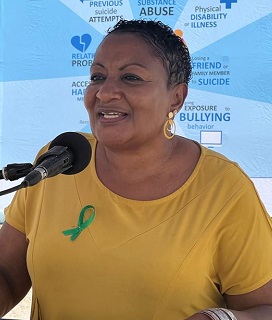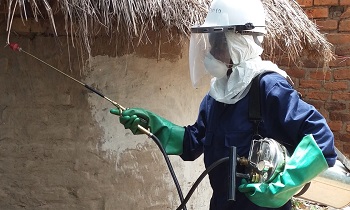
Nation continues to battle with high suicide cases – 790 lives lost in 18 months

The current national statistics indicate that from January 2021 until July 2022, 790 persons lost their lives due to suicide, an official said on Thursday on the occasion of the commemoration of World Suicide Prevention and World Mental Health Days.
Dr Ester Muinjanue, the Deputy Minister of Health and Social Services said out of this number, 649 were adult males: 102 adult females, and 39 persons were under the age of 18.
“Out of the total number, 124 persons were from Omusati Region of which 99 were adult males, 19 adult women and 6 youths (five girls and one boy),” she said, adding that the mode of suicide is 100% hanging.
According to Muinjanue, suicide attempts from Omusati Region are 179 and all are female youth, who took tablets or medicines. These statistics are from March 2021 to April 2022, while during 2020 the suicide attempts were 138.
“These are alarming numbers and I would like to encourage all of us, to be that hope in the circles we move in, and encourage ourselves, family members, friends, and colleagues at work to seek professional help. I believe that when we as a community stand together to create that HOPE, we can certainly prevent suicide. People should not be ashamed to talk about how they feel,” she said.
Muinjanue stressed the importance of mental health promotion and suicide prevention, as the two go hand in hand. “When we ensure mental health and access to mental health services, we can confidently say that we are preventing suicide as well,” she said.
The prevalence of mental disorders in young people is a major public health concern: globally one in seven, 10 to 19-year-olds experience a mental disorder, accounting for 13% of this age group. Depression, anxiety, and behavioural disorders are among the leading causes of illness and disability among adolescents and suicide is the fourth leading cause of death among 15 to 19-year-olds,” she added.
Meanwhile, the prevalence of mental illnesses in Namibia is estimated to be 25.6%, and it is expected to double by 2025.
“Therefore mental health awareness is very important and should be done vigorously by all of us. Suicide prevention and mental health promotion amongst adolescents and young people are imperative given the limited mental health services available to this age group. Additionally, early detection and intervention prevent mental health conditions extend to adulthood enhancing young people’s chances of leading fulfilling lives as adults.”
Muinjanue pleaded with the nation to put mental health promotion high on the agenda to create and maintain a mentally healthy nation.













































